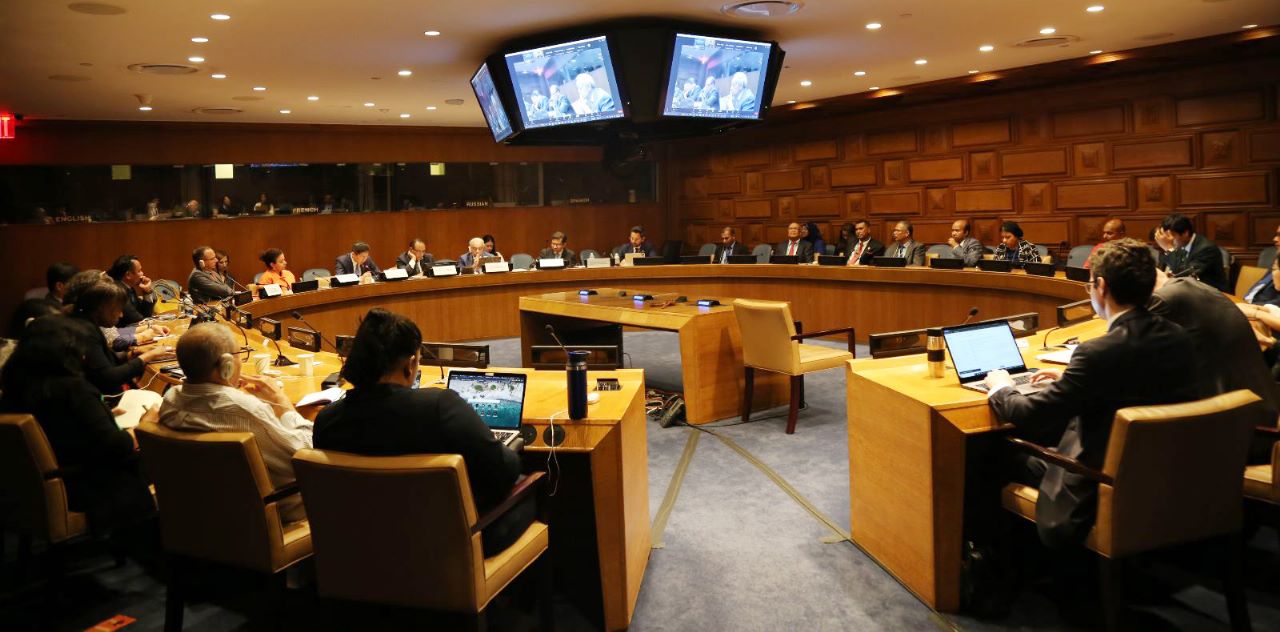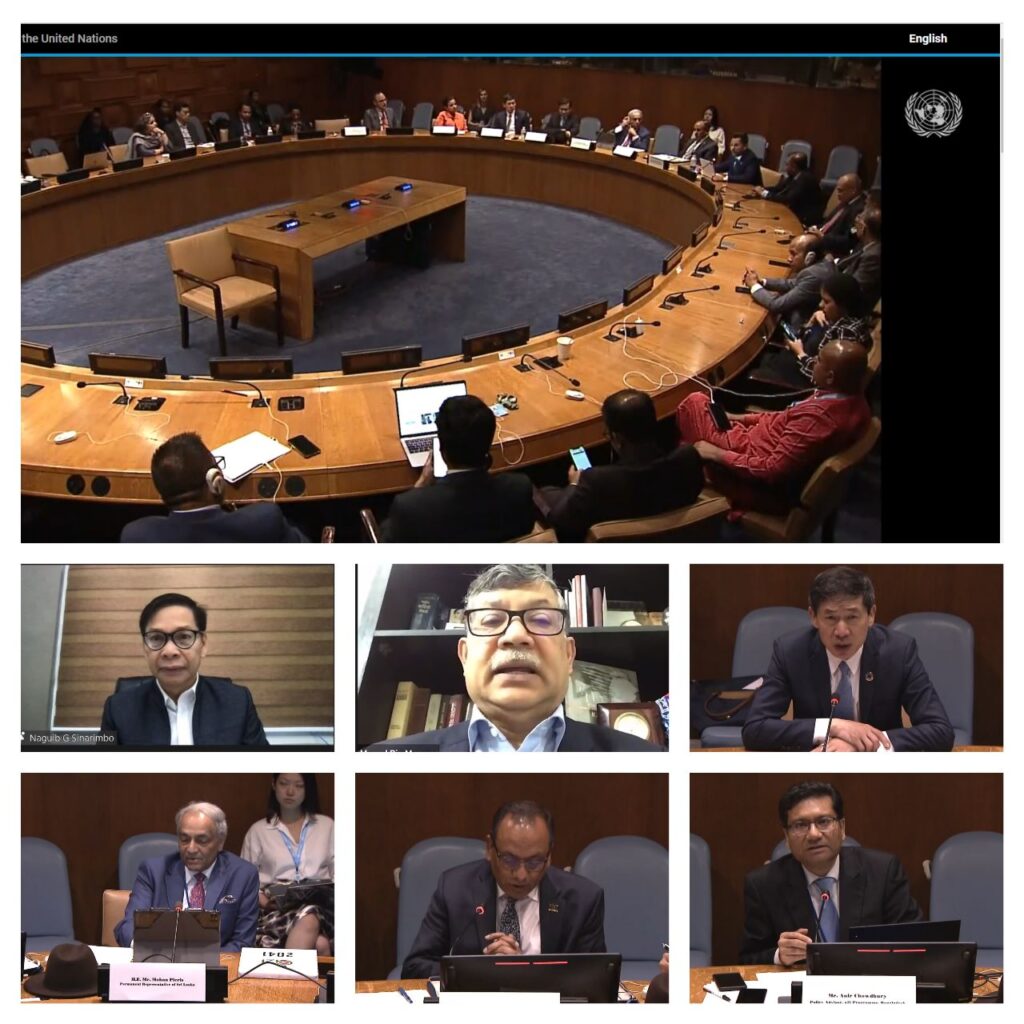High-Level Side Event Calls for Renewed Partnership in South-South and Triangular Cooperation to Bridge the Digital Divide
Dhaka-Bangladesh, 15 July: In a significant event held today at the United Nations Headquarters, the Government of the People’s Republic of Bangladesh organized a High-Level Side Event titled ‘Renewed Partnership in South-South and Triangular Cooperation: leveraging Innovation and Cutting-edge Technology’. The event aimed to address the digital divide and explore ways to bridge the gap through inclusive and innovative solutions.
The event highlighted the challenges faced by developing nations, particularly in the global south, in accessing the benefits of technological development. It emphasized the South-South cooperation tailored solutions to address these needs and facilitate digital transformation, which is crucial for sustainable development.
Representatives from United Nations member states, government officials, delegates from various countries, development agencies, international organizations, civil society, academia, and the private sector actively participated in the event. The diverse composition of the attendees ensured comprehensive and inclusive dialogues, fostering knowledge sharing, collaboration, and the formation of partnerships among different sectors and actors involved in this cooperation.
The event’s outcomes are expected to be profound and far-reaching. They include leveraging South-South cooperation to reduce the existing digital divide in global southern countries, enhancing understanding of the impact of South-South and triangular cooperation in tackling global challenges through innovation and technology, recognizing effective approaches and achievements in utilizing advanced science and future-oriented technologies for sustainable development, and exploring possibilities for collaborative research, joint initiatives, and partnerships in areas of common interest.

The event began with welcome remarks by Mr. Muhammad Abdul Muhith, Ambassador and Permanent Representative of Bangladesh to the United Nations, followed by opening remarks from Mr. Masud Bin Momen, Senior Secretary, Ministry of Foreign Affairs of Bangladesh. H.E. Ambassador Mr. Mohan Pieris, Permanent Representative of Sri Lanka to the United Nations and President of the 21st Session of the UN High-Level Committee on South-South Cooperation, also delivered his remarks, as well as remarks were delivered by H.E. Naguib Sinarimbo, Minister of the Ministry of Interior and Local Government from the Bangsamoro Autonomous Region in the Philippines. Mr. Haoliang Xu, Under-Secretary-General and Associate Administrator of the United Nations Development Programme (UNDP), shared his insights on the topic.
Anir Chowdhury, Policy Advisor of Aspire to Innovate-a2i, the national innovation agency of the Government of Bangladesh with technical support of UNDP, presented a key-note presentation on ‘e-Quality for Inclusive Innovation’. He highlighted some examples of the initiatives taken to reduce the gap of the digital divide and highlighted the implementation of the e-Quality Center for Inclusive Innovation to address it. He said, “It can contribute to the ultimate goal of equitable development. It is only through the use of e-quality data that it will be possible to create inclusive digital policies to reduce the potential digital divide in the future and work on the basis of public-private partnerships to provide better services to the local population.”
Explaining the importance of global cooperation and partnership, Mr. Masood Bin Momen, Senior Secretary of the Ministry of Foreign Affairs said, “With the digital revolution, the digital divide in today’s world is acting as a catalyst for creating inequality in society. However, if managed properly, digital development will play a strong role in the overall economic and social sphere, ensuring e-quality. This context is proposed to establish e-Quality Center for Inclusive Innovation aiming to ensure zero Digital Divide for the world. It will open up avenues for excellent chemistry and collaboration of international partners and communities. Such collaboration will support and enrich countries to enable improved quality of life for its citizens.”
Mr. Mohan Pieris, H.E., Permanent Representative of Sri Lanka to the United Nations in New York and President of the 21st Session of the United Nations High Level Committee on South-South Cooperation, highlighted the importance of bringing the digitally backward population under inclusive policies.

Ms. Dima-Al-Khatib, Director of South-South Cooperation of the United Nations Office, mentioned the strengthening of South-South and Triangular Cooperation to reduce the digital divide in underdeveloped countries, including the countries of the South. The United Nations is committed to providing overall guidance and support in the implementation of the proposed initiatives to build a non-discriminatory digital state and meet the SDG targets.
A panel discussion moderated by Mr. Anir Chowdhury, featured by notable speakers, including Ms. Dima Al-Khatib, Director of the United Nations Office for South-South Cooperation (UNOSSC); Mr. Anil Kayalar, First Counsellor and Deputy Permanent Representative of the Permanent Mission to the United Nations, Republic of Turkiye; Mr. Camilo Tellez-Merchan, Deputy Managing Director of the Better Than Cash Alliance, United Nations Capital Development Fund; Ms. Vyjayanti T Desai, Practice Manager of ID4D and G2Px at The World Bank; and Dr. Selim Jahan, Former Director of the Human Development Report Office (HDRO) of the United Nations Development Programme (UNDP) and Lead Author of the global Human Development Report (HDR).
The Government of Bangladesh, shared its remarkable progress in revolutionizing public services over the past decade and a half. This transformation has resulted in substantial savings of 19 billion workdays and USD 22 billion. Moreover, it eliminated 13 billion visits to government offices, benefiting marginalized and underserved populations.
Building on this success, Bangladesh has actively served as the Secretariat of the South-South Network for Public Service Innovation (SSN4PSI), in collaboration with the United Nations Office for South-South Cooperation. With over 60 countries and international organizations as members, the network has facilitated knowledge sharing and technology transfer to support LDCs and developing countries. Notable examples include the Philippines, Somalia, Jordan, Yemen, Turkey, South Sudan, and Fiji, which have benefited from innovative digital solutions provided by Bangladesh.
In response to the increasing demand for support and guidance, Bangladesh is in the process of establishing the e-Quality Centre for Inclusive Innovation. This visionary initiative aims to ensure zero digital divide worldwide by sharing digital solutions proven to transform underserved communities, establishing an International ICT Innovation (i3) matching fund facility, and conducting research on digital divide standards, e-Quality index, and strategies to address pressing issues.
The event concluded with a closing remark by Mr. Md Shamsul Arefin, Secretary of the Information and Communication Technology Division of the Government of Bangladesh.
As the world recognizes the urgent need to bridge the digital divide and achieve inclusive development, events like this High-Level Side Event provided a platform for collaboration, knowledge exchange, and the formulation of innovative solutions. The global community remains committed to leveraging technology and cooperation to create a more equitable and connected world.
